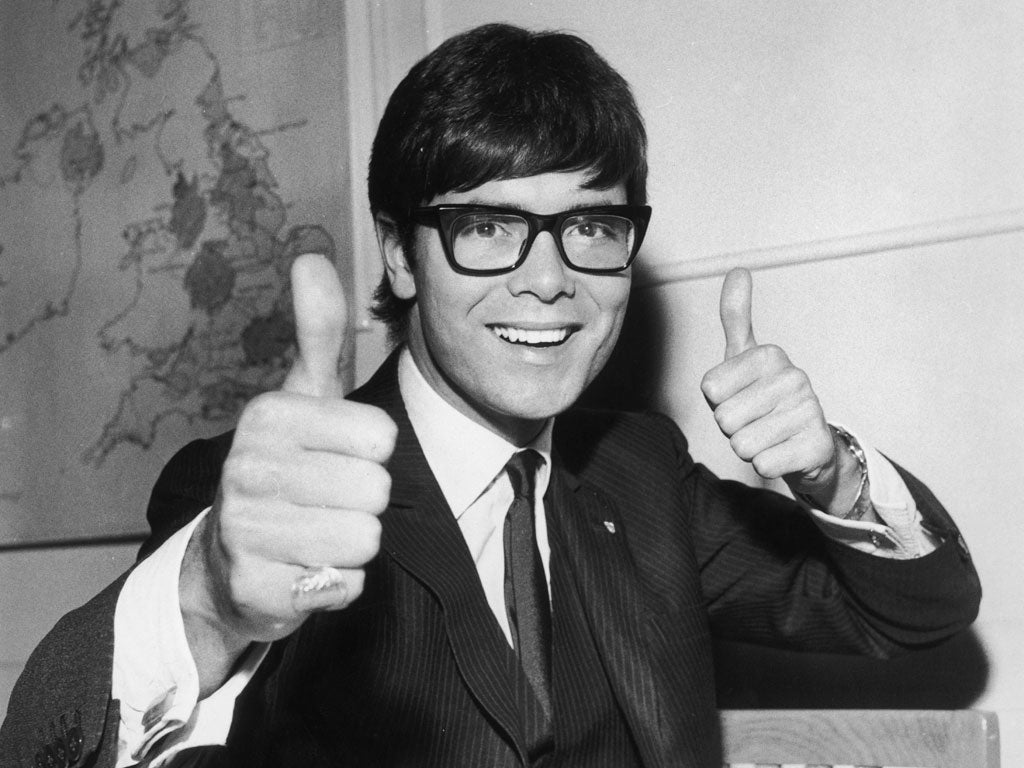The joy of guilty pleasures: Did Grayson Perry just out Nicholas Serota as a Cliff Richard fan?
This revelation requires more than a little serious consideration


Grayson Perry’s Reith Lectures looked at questions of taste in art. It was a stimulating, philosophical exploration of what is and isn’t good art, how this is decided and by who. But I have to confess I was distracted from its worthier points by a little aside that he made. He mentioned that he lived near Tate director Sir Nicholas Serota and had been “lucky enough to see his world-class collection of Cliff Richard memorabilia”.
How could one concentrate on the weightier propositions in the lecture, when confronted with this revelation? I tried to join Grayson Perry in musing on who are the arbiters of taste, but every time I did, such thoughts were usurped by visions of Sir Nicholas leading a group of Tate funders round the current exhibition of Paul Klee, while quietly humming “Bachelor Boy” to himself, imagining him at home serenading his delightful spouse with “Living Doll” or inadvertently breaking into a chorus of “Summer Holiday” while viewing the British Pavilion at the Venice Biennale.
This is in no way to denigrate the Serota penchant for all things Cliff. Quite the reverse. I am a firm believer in guilty pleasures. I have been known myself to come home from a cutting edge exhibition at Tate Modern, and relax from its intellectual challenges by curling up with a Neil Diamond album— for some only a couple of steps up from Cliff.
But don’t decry guilty pleasures. They have an added validity in the consideration of culture. Take Nicholas Serota. He is undoubtedly one of the leading arbiters of artistic taste in this country, if not the world. That he can leaven his embrace of conceptualism with a blast of Cliff demonstrates that artistic taste is a complex matter. It should not be, as it so often is, a job lot of names across the art forms that are deemed to be intellectually challenging and cutting edge. Artistic experience should include the simple, the relaxing, the unchallenging. For they all play their part if we are to consume the full breadth of culture, past and present.
One should seek to be stimulated and provoked by art. But why can’t one also seek to be soothed and comforted by art? There are enough hours in the day for the fully rounded experience.
Sir Nicholas being outed as a Cliff fan has actually done a service to the arts. It has shown that a love of culture, even by the most esteemed arbiters of taste, means eclecticism and a wide range of stimuli, eschewing the pompous notion that there are prescribed and proscribed lists. He should be wholeheartedly commended for that. So, to use a word that is music to his ears — “Congratulations.”
The Turner Prize is designed to encourage debate about contemporary art, and most years it does just that. I do wonder, though, whether this year’s exhibition, which opened last Tuesday in Derry, can achieve that aim. One of the four shortlisted artists, Tino Seghal, refuses to allow his work to be photographed, and in newspaper reports on the exhibition it was conspicuous by its absence. This seems to me not just an arrogant stance to take, but one that is in clear defiance of the prize’s objective. One can hardly debate art that one cannot see, or can only see if one lives in Derry. Surely a criterion for being shortlisted should be allowing your work to be photographed.
I haven’t yet watched the TV drama series The Tunnel, which is based on the Scandinavian series The Bridge. But one thing I know without even watching it: the thriller about a murder in the Channel Tunnel will not feature a fire or a train crash. I know it because it was reported in this paper that Eurotunnel told Sky Atlantic, which screens the series, that it did not want to see anything that portrayed a fire in the tunnel or train passengers in danger, as either scenario might alarm UK viewers planning to take a trip to Paris. I rather wish that Sky Atlantic had had the courage to say: “We are grateful for your permission to film in the Channel Tunnel, but you don’t tell us what we put in the script. And frankly we think viewers are sophisticated enough to distinguish between fiction and real life.” The precedent it now sets of organisations giving permission to use a location provided they have the power of veto over the script makes me decidedly uneasy.

Join our commenting forum
Join thought-provoking conversations, follow other Independent readers and see their replies